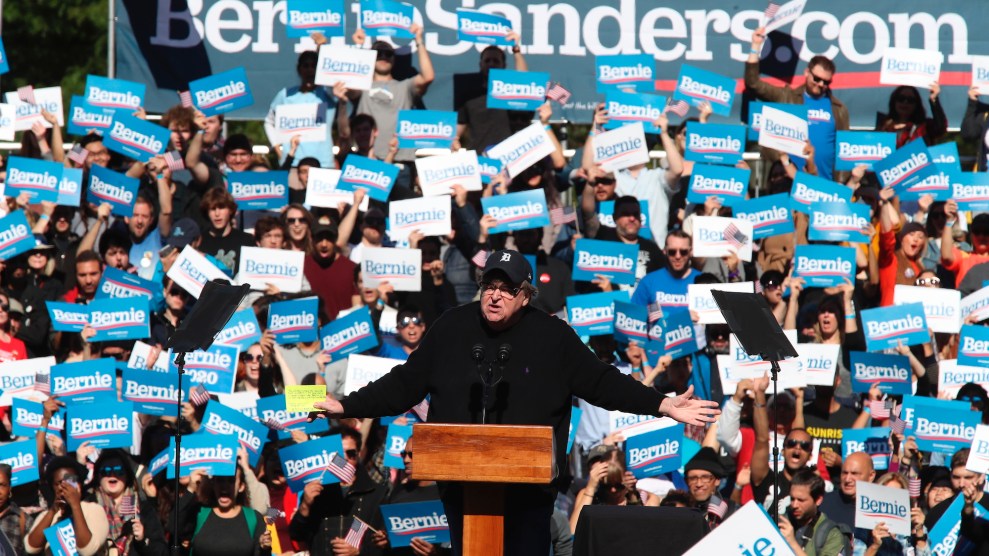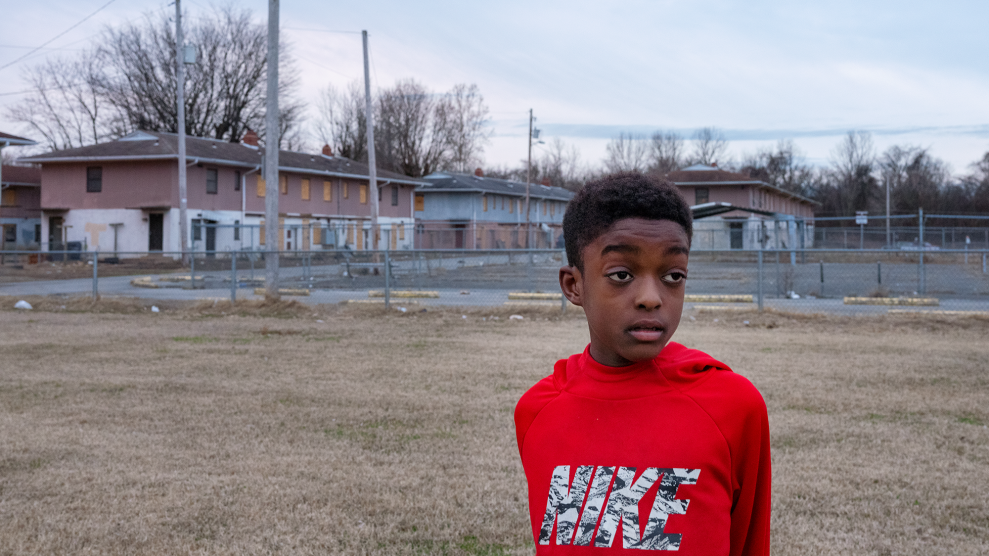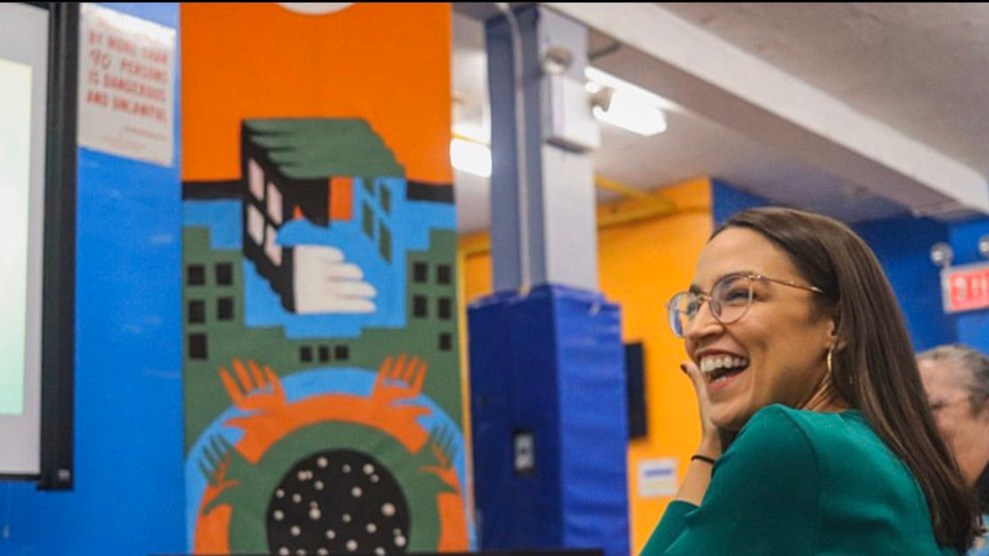
Gabriel Hernández Solano
For years, tenants in New York’s public housing residences had complained about the black mold breeding on the walls, the brown liquid dripping from the ceilings, and the cold water flowing from the faucets. But the city hadn’t made repairs. One white-skied Saturday this past November, neither New York City Housing Authority head Gregory Russ nor mayor-turned-presidential-candidate Bill de Blasio was present in the crowd of activists and public housing residents who took the 5 train to the Bronx and huddled in a blue-walled basement in the Pelham Parkway Houses to announce their support for a Green New Deal for public housing. But Rep. Alexandria Ocasio-Cortez sat on a folding chair in the front row, listening.
La Keesha Taylor, a resident of Holmes Towers on the Upper East Side, stood on a small stage in front of about 80 people, holding an enlarged photo of her son’s bed and pillow, spattered with blood. She said she recently heard him coughing in his bedroom and found him bleeding from his nose and mouth, which she blamed on the excessive heat in her apartment. “There’s always a problem, every single year, when we change to wintertime and it’s time for housing to give us heat and hot water,” she said. “I don’t know why they can’t get it right. Winter comes every year.”
When she complained about the excessive heat at a tenant association meeting, her superintendent told her that if he fixed the heat, he would raise her rent. “Now we’re being intimidated,” she told the crowd. “You’re trying to make me afraid to complain. You’re trying to keep me beholden to this system, this system of abuse.”
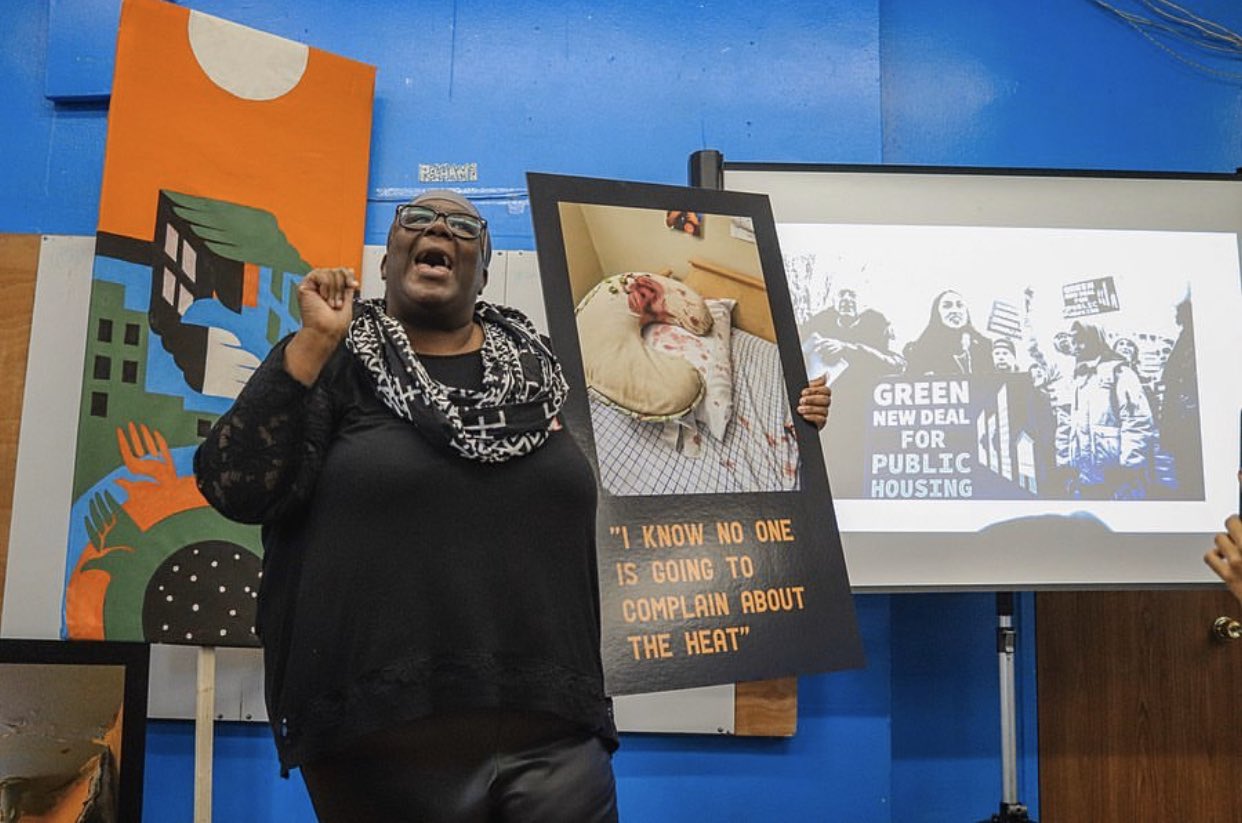
La Keesha Taylor addresses the crowd, holding a photo of her son’s bloody pillow.
Gabriel Hernández Solano
This is the system of intimidation that Ocasio-Cortez’s disciples sought to combat following her election to Congress. In 2019, two of Ocasio-Cortez’s former campaign staffers, Ilona Duverge and Gabe Tobias, launched Movement School, a training program that teaches working class activists how to run grassroots political campaigns. One subset of the organization, Reclaim NYCHA, teaches housing authority tenants like Taylor how to advocate for themselves in an underfunded public housing system.
When Ocasio-Cortez stepped on stage in the Pelham Parkway basement, she addressed the rapt crowd with the same aspirational energy that has come to define her rise to prominence. “Public housing was once regarded one of the best places to live in America,” she said. “It was only when we talked ourselves out of it that things started to erode. It was only when we decided that it wasn’t worth it anymore that it started to hold back. But as long as we valued it, it was important.” Applause pierced the air as she continued, “And we can value it again. And we should value it again.”
NYCHA, a city agency that receives both state and federal funding, is New York’s largest landlord, housing 1 in 15 city residents. More than half a million New Yorkers live in NYCHA or in federally subsidized Section 8 housing across the city’s five boroughs. That’s a potentially significant voting bloc, especially given the consistently low voter turnout in local elections. In the 2017 mayoral election, for example, just 1.15 million of the city’s 4.6 million active voters cast a ballot.
But NYCHA residents haven’t experienced strength in numbers. Instead, lawmakers at both the state and federal level have been ignoring them. Most NYCHA buildings are more than 50 years old, and ever since President Bill Clinton signed the Faircloth Amendment into law in 1999, the Department of Housing and Urban Development has been prohibited from adding units to the net public housing stock. According to NYCHA, steady federal and state disinvestment in the authority since 1998 has allowed the buildings to deteriorate.
In 2017, a New York City Department of Investigation report revealed that NYCHA had lied to the federal government, falsely asserting that it had inspected 55,000 apartments for lead paint. Local news site the City reports that 1,100 children living in NYCHA have tested positive for elevated blood-lead levels since 2012. After HUD appointed a federal monitor to oversee the housing authority, NYCHA employees continued to cover up hazardous situations, replacing missing ceiling tiles with cardboard and plugging over rodent holes without addressing the infestations, according to the City. While the authority can use independent contractors for repairs, it’s ultimately NYCHA’s responsibility to make sure the apartments are livable.
NYCHA tenants were getting fed up. So, working from the principle that 400,000 New Yorkers have enough collective power to enact change, Duverge, just 22, decided to channel their frustration into action.
Duverge knows how it feels to be overlooked by those in power. When Donald Trump was elected president in 2016, Duverge was undocumented, having moved to the United States from the Dominican Republic when she was two months old. “To the Trump administration, I’m seen as a threat, I’m seen as an outsider, I’m seen as an infestation to society,” she said. “That really politicized me.”
In 2017, the same year she gained citizenship, Duverge, then a student at John Jay College of Criminal Justice, joined the campaign of Randy Abreu, a progressive challenging an incumbent Democratic city councilman. Abreu was unsuccessful, but Duverge’s next campaign wasn’t. After working field on Ocasio-Cortez’s primary campaign, she became her deputy organizing director during the general election, planning events and mapping out canvassing routes for volunteers. She called the endeavor “organized chaos,” the sort of atmosphere she thrives in. There, she met Tobias, another field team leader, who would become her partner in running the Movement School.
Energized by the “people-powered movement” that launched Ocasio-Cortez to a primary victory over the entrenched Democratic Caucus Chairman Joe Crowley, Duverge wanted to make it easier for working class people to get involved in politics. “What happens when your candidate doesn’t have a Rolodex of millionaire friends?” she said. “It was really homing in on this ideological view of how to build a true grassroots campaign, and we knew that that didn’t exist.”
During Ocasio-Cortez’s general election campaign—largely a formality in the overwhelmingly blue district—Duverge and Tobias launched a series of webinars about progressive organizing for campaign volunteers “as a way to continue building momentum and taking the time to teach and engage the community in the political process formally,” Duverge said. In February 2019, the duo launched a 10-week Campaign Fellows Program providing online professional development for 71 people involved in political campaigns across the country. In July, they directed their energy toward public housing and founded the Reclaim NYCHA program, which Duverge oversees. For 12 weeks from September through November, the 20 fellows accepted into the free Reclaim program learned about how to get involved in county committees, tenant associations, and individual projects while knowing their rights as NYCHA residents.
Duverge sees the Movement School as part of a larger movement to diversify the voices of the key players in community politics and beyond. “You’re seeing more people of color, more working class folks starting to find their voice a little bit more,” she said. “That’s why the politics in our country as a whole, regardless of the presidential race, is just shifting. Because you’re seeing these movements spark up backing working-class, everyday citizens as the representatives.”
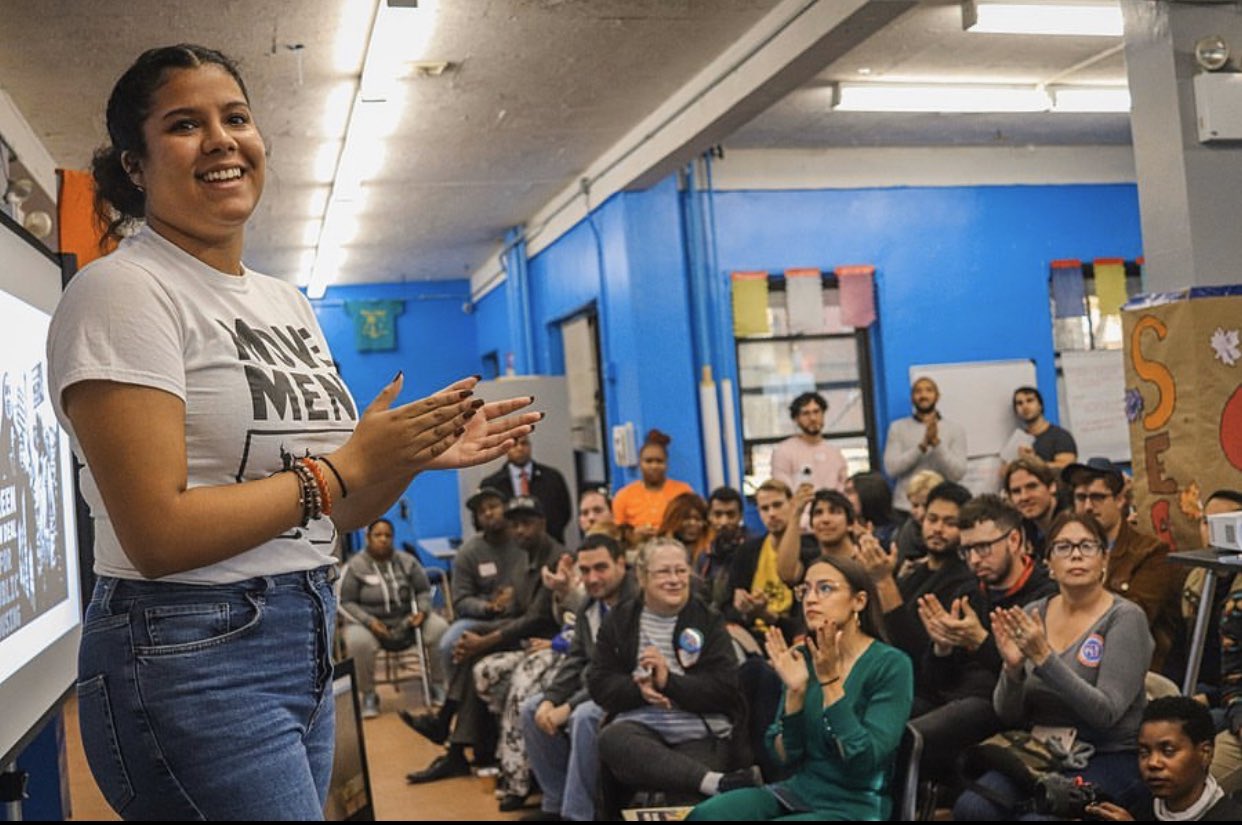
Ilona Duverge stands on stage at a community event in Pelham Parkway.
Gabriel Hernández Solano
On a Saturday in October, at one of the group’s weekly in-person meetings, eight of the fellows gathered in a basement classroom of the City College of New York in Upper Manhattan to hear communications consultant Christina Hernández explain how to “amplify their message.” She clicked through a PowerPoint presentation, replete with gifs, that instructed students on writing press releases, pitching media organizations, and taking advantage of social media. At one point, she paused and asked me to tell the fellows how I decide which press releases to read and which to skip over. I said that they were at an advantage, since none of them represented a soulless corporation.
One student, Kimberly Tyre, was particularly engaged, the first to shoot her hand up when Hernández asked the class to participate. Tyre, a 52-year-old resident of the Jefferson Houses in East Harlem, has been protesting the rodent infestation, mold, and lack of heat in her apartment by going on rent strike. Through the Movement School, she hopes to enlist other NYCHA residents in similar circumstances to join her. She has already knocked on the doors of every apartment in two of her development’s 18 buildings. “I got positive feedback from that,” she said. “Making them aware of the rats, making them aware of the issues that we’re currently experiencing with NYCHA.”
Tyre told me that she has refused to pay her $497 monthly rent since December 2018, when a court ordered NYCHA to repair her apartment, whose problems included a dilapidated cabinet, a damaged front door, loose plaster in the bathroom, black mold on a bedroom ceiling, and a mysterious brown substance in the bathroom she can’t get control of. She said repair workers have come, but their work has been incomplete because they didn’t have the necessary equipment to finish the job. She also echoed a complaint I’ve heard from several other NYCHA residents: The hours that repair workers come are highly unpredictable, and NYCHA often requires residents to be in their apartments for whole days on weekdays to let them in, which keeps them from their jobs and other obligations. “I failed one of my math classes for NYCHA twice,” Tyre, who earned her psychology degree at Mercy College, said, “because of giving them access for an exterminator on Tuesdays and Thursdays.”
Tyre says the living conditions have had adverse effects on her and her children’s health. Two of her sons, aged 13 and 17, suffer respiratory distress even though they’re not asthmatic, and she suspects her alopecia, which robbed her of the long curly hair she had when she moved into her apartment in 2001, may be related to her living situation. “I’m trying to remain positive and hopeful,” she said. “But sometimes it gets overwhelming and it goes into a state of emotional distress.”
She said that the Movement School has empowered her in her fight against NYCHA. “Now I know the terminology to use, because we had legal assistants come to teach us the legal rights,” she said. “I’m trying to really mobilize people to see, don’t let NYCHA and the big fish, a big system, intimidate you.”
Still, Tyre has had trouble finding other people to join her strike, because tenants are afraid that they’ll be evicted for non-payment. In class, Tyre said that her fellow tenants felt “hopeless, fearful that there is nothing they can do.” But she hopes that if she withholds payment for long enough, NYCHA will be forced to make things right.
After class, the fellows spilled out onto Convent Avenue, chatting about the impeachment proceedings against President Donald Trump. Duverge, in jeans and a shirt emblazoned with the first names of the four progressive congresswomen who make up the “Squad,” ushered the group into two separate Ubers headed to Ellie’s Diner in the Bronx, where Ocasio-Cortez and Sen. Bernie Sanders (I-Vt.) were hosting a meet-and-greet with supporters.
The activist gathering in the Pelham Parkway Houses in the Bronx was not only an outlet for tenants fed up with the system; it was also an effort to garner support for a piece of legislation, introduced by Ocasio-Cortez and Sanders, aimed at improving the living situations of public housing residents across the United States: A Green New Deal for Public Housing.
The bill proposes to decarbonize the entire public housing stock in America, and to employ public housing residents to renovate the facilities. Ocasio-Cortez sees potential for the Reclaim fellows to push legislative change, which may be the only recourse in situations like Tyre’s, when individual action doesn’t seem to be enough.
“Grassroots organizing was the biggest force behind getting the rent and tenant protections passed this year in New York state,” Ocasio-Cortez told me, referring to the Housing Stability and Tenant Protection Act of 2019, which prohibits landlords from evicting tenants for making complaints and limits security deposits to one month’s rent, among other reforms. “Grassroots movements, I think, are really critical to getting that immediate change on the local and state level on a policy front, not just an electoral front.”
Taylor, the impassioned speaker whose son suffered in the excessive heat, sees the Green New Deal as a “green new light” of hope as her faith in NYCHA wanes. The Movement School has provided Taylor legal help with a petition for repairs in her development, and she’s attempting to enlist residents in other developments to file actions as well. But, she said, “they’re an authority, and you are a person, and that’s the problem. They have lawyers on top of lawyers on top of lawyers, and the only way to get things done is to go to court.”
“I don’t trust NYCHA,” she said, at the height of her speech to the crowded basement. “The Green New Deal is our hope. They are going to invest in our developments—not only ours, but all over the nation. We’re going to get brand new things. They’re going to revitalize the developments. They’re going to build. They’re going to give us union jobs. They’re going to give us hope.”
Several voices shouted, “Amen!” as the audience burst into applause. Ocasio-Cortez sat cross-legged in the front row, beaming.

